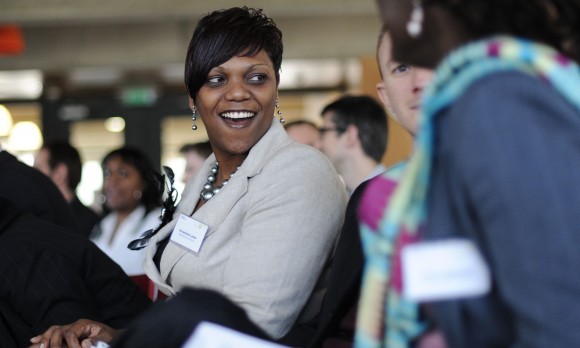Cool School
By Figen Gunes
Immediately walking in, the buzz of new ideas inspires the visitor to dream big. Then the writing on the wall near the entrance further boosts your motivation: ‘Everyone has a capacity to be remarkable’. In this place, it really is true.
Londoners from diverse backgrounds who want to transform daily life through social projects pitch their ideas in a Dragons’ Den style selection process to get on to a training programme offered by the School for Social Entrepreneurs (SSE).
The school, based at a decommissioned fire station near London Bridge, is almost a perfect spot for people with burning desires to transform others’ lives. ‘Fit to burst’ and ‘Let’s roll’ are some of the light-hearted company names created by students for their social projects.
Since 1997, the school has helped more than 1,000 ideas come to life: from a bar that doesn’t serve alcohol to a project for single mothers feeling depressed on housing estates. Former gang members studied at the school and brought in other ‘bad boy’ students who changed their lives around. Since then reformed graduates have won several public sector contracts after reducing offending rates through their work.
Students learn through a year-long training programme based around action learning. Writings on the wall in the selection room confirm the school’s principles: “An ounce of action is worth a ton of theory.” If someone is selected for the programme, they visit school only for a couple of days each month. There is no direct teaching involved. Students draw from the experience of visiting witnesses; mainly expert social entrepreneurs with proven track record.
Charlotte Young, Chair of SSE, explains why the school is important in transforming society. “We know that SSE helps students make a far greater impact than they would otherwise, because in all our evaluations those that have been through our programmes report a strong transformational effect. “But perhaps more important than this are the hundreds of social ventures that have been set up and most of which have remained resilient and successful and which address local or focused social issues in a way that involves and empowers beneficiaries. “The Action Learning method we use isn’t at all dependent on people’s education or knowledge background. We get students of every type, strongly varied by age, ethnic group, area of interest, prior experience, and in what they are trying to do. This variety is what helps people to work out practical workable plans and to get the confidence and support to take action. The things they have in common is their drive to make the world a better place and they are amazed to find this group of people with the same drive as them who are willing to give them mature criticism as well as active help and support,” Young adds.
More and more university graduates are applying to SSE because of the increased disillusionment with the corporate world and conventional jobs, according to Young. She adds: “I think there are probably two main reasons – one is that during the lifetime of SSE (that is since 1998) there has been a significant rise in the proportion of the population attending university. This appears to have greatly grown the percentage of people attending who have experience of exclusion and the will to do something about it. The second reason may be that university graduates now face a much starker need to take control over life after university rather than either following a deeply worn pathway towards relatively automatic transition to professions or large corporations or the opposite – unemployment or underemployment. Disillusionment with big companies, lack of real jobs and probably greater search for meaning encourage those with strong drives to pursue entrepreneurialism and a proportion of this will be in the community sector.”
On the selection day, students pitched a variety of ideas such as setting up a centre for young offenders and keeping them occupied with constructive activities once they are out of custody. Applicants were visibly hesitant to share more details about their ideas at that stage just in case it gets stolen. There was another bright idea which excited Charlotte Young. A mother of two introduced her idea to produce a smartphone app for babies with breastfeeding problems. She wants to compile mothers’ experiences with all the information available online and present it in a more simplistic way. Young grilled the candidate with questions to see whether the project can reach right through to less privileged mothers as well. If this app is something nice and useful only for middle class mothers, then the school would not be willing to support it.
The School for Social Entrepreneurs was set up by Michael Young who is also the founder of remarkable organisations like the Open University and Which Consumers’ Association.
www.sse.org.uk















Write Your Comment